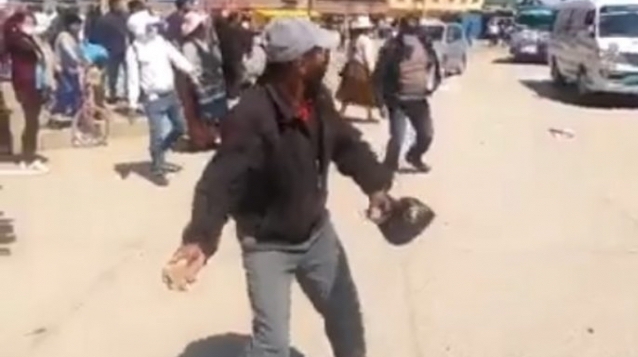
Tensions are escalating in Bolivia ahead of the first post-coup elections, which after numerous postponements are now slated for Oct. 18. On Sept. 21, a youth meeting of the Movement to Socialism (MAS) in the Manufacturing Complex of the working-class city of El Alto was attacked with tear-gas bombs by unknown assailants, causing an exodus from the cavernous space. (Nodal, Argentina, Sept. 21) Three days earlier, MAS supporters in the mining hub of Oruro hurled stones at a vehicle caravan of the right-wing Creemos (We Believe) coalition, forcing it to retreat from their barrio, known as the Mining Helmet for the strength of organized labor there. The protesters shouted “Out, out, out! Oruro must be respected!” (¡Fuera, fuera, fuera, Oruro se respeta!) (Bolivia Prensa, Sept. 18)
On Sept. 17, the interim president, Jeanine Añez, announced that she is dropping out of the race, in order to unify the right-wing vote and block the victory of the MAS candidate, former economy minister Luis Arce. “Today I put aside my candidacy for the presidency of Bolivia, for the sake of democracy. If we do not unite, Morales will return,” she said in a televised address, referring to ousted MAS president Evo Morales. “If we do not unite, democracy loses.”
“It’s not a sacrifice, it’s an honor,” she added in a tweet. Añez did not endorse any of the remaining candidates. To avoid a run-off, a candidate would have to win at least 40% of the vote in the first round, with a 10-point advantage over the closest competitor. Recent polls have placed Arce in first place with more than 40% support among likely voters. Center-right ex-president Carlos Mesa of the Comunidad Ciudadana alliance is next at 26%, with longtime right-wing opposition leader Luis Fernando Camacho of Creemos in third place at 14%. Añez was lagging in fourth place with just over 10%. (BNAmericas, Sept. 28; Al Jazeera, Sept. 18; NYT, Sept. 17)
Camacho’s running mate is Marco Antonio Pumari, and the two men were the most prominent opposition civic leaders in the departments of Santa Cruz and Potosí, respectively. They have been waging the most aggressive campaign, crossing the country in a caravan to hold rallies in the principal cities. They have come under criticism for not wearing masks and observing measures to contain COVID-19 at the events. (Pagina Siete, La Paz, Sept. 19)
Añez has been waging a bitter war of words wth Argentina, where Morales is exiled, accusing the Buenos Aires government of conspiring with him to foment unrest in Bolivia. “By what right do they harbor a violent conspiracy by Evo Morales against Bolivia’s democracy from Argentine soil?” Áñez said in her address to the UN General Assembly on Sept. 23. She accused Morales and his international supporters of seeking to re-impose his “caudillismo”(strongman rule). (Bloomberg, Ámbito, Argentina, Sept. 23)
On Sept. 28, three members of Añez’s cabinet resigned, throwing her government into crisis. Economy Minister Oscar Ortiz said at a press conference that he stepped because he believed he was about to be fired from his post. Shortly thereafter, Labor Minister Oscar Mercado and Development Minister José Abel Martinez also announced their resignations. Ortiz had recently opposed the government’s decision to hand back shares of a nationalized electricity company to a group of private investors, calling the move irregular so close to the elections. ELFEC, the electrical utility in Cochabamba department, had been nationalized under the Morales government. (MercoPress, Oct. 1; DW, EFE, Sept. 29)
In another sign of internal power struggle, the government was criticized in July for promoting a group of military officers without approval of the legislature, where MAS has a majority. MAS accused the government of violating the constitution. José Miguel Vivanco of Human Rights Watch seemed to agree, tweeting that someone should explain the “separation of powers in a democracy” to Añez. (Buenos Aires Times, July 17
Evo Morales has been blocked by the courts from seeking a senate seat in the elections, and has denounced the ruling as “political and illegal.” (Al Jazeera, Sept. 8) He has also been charged with “terrorism” and “sedition” in Bolivia, for his supposed involvement in post-coup protests. The Justice Ministry additionally filed a criminal complaint against Morales in August for statutory rape and human trafficking. The new charge came after photographs were published in national media of the ex-leader with a young woman who was reportedly a minor at the time. (BBC News, Aug. 21)
Interpol on Oct. 1 rejected Bolivia’s request for an arrest order against Morales, stating that the charges against him appear politically motivated. (DW, Oct. 1)
Photo: Bolivia Prensa




